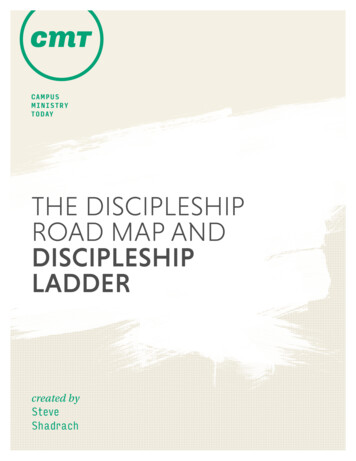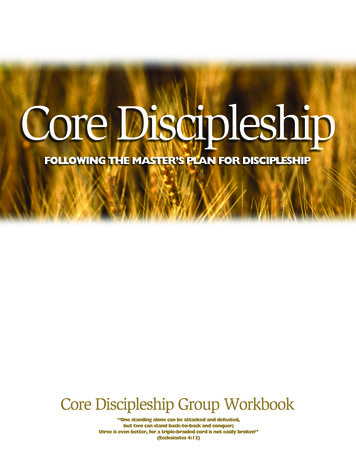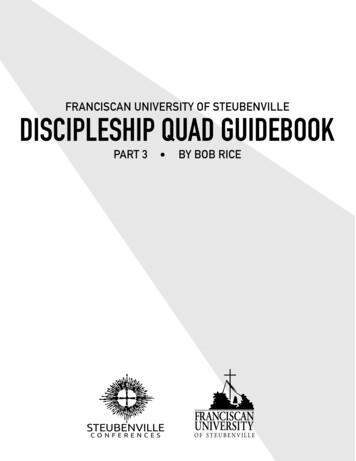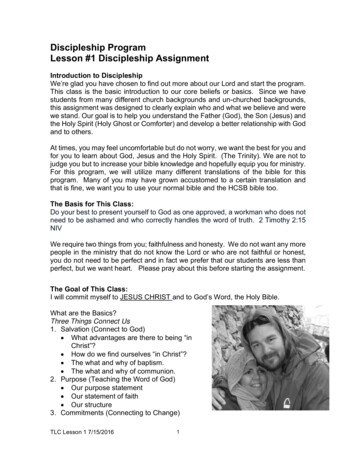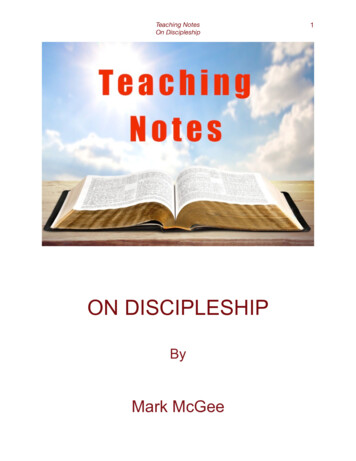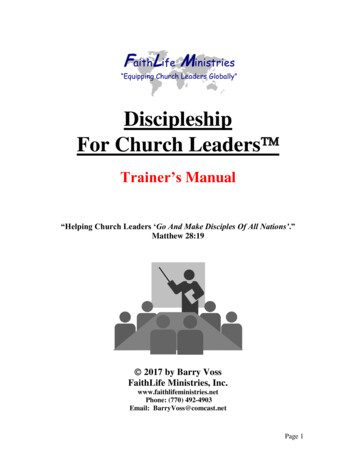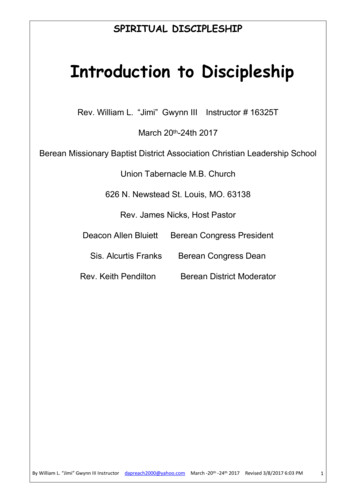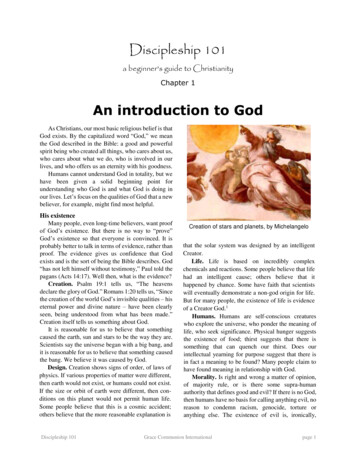
Transcription
Discipleship 101a beginner's guide to ChristianityChapter 1An introduction to GodAs Christians, our most basic religious belief is thatGod exists. By the capitalized word “God,” we meanthe God described in the Bible: a good and powerfulspirit being who created all things, who cares about us,who cares about what we do, who is involved in ourlives, and who offers us an eternity with his goodness.Humans cannot understand God in totality, but wehave been given a solid beginning point forunderstanding who God is and what God is doing inour lives. Let’s focus on the qualities of God that a newbeliever, for example, might find most helpful.His existenceMany people, even long-time believers, want proofof God’s existence. But there is no way to “prove”God’s existence so that everyone is convinced. It isprobably better to talk in terms of evidence, rather thanproof. The evidence gives us confidence that Godexists and is the sort of being the Bible describes. God“has not left himself without testimony,” Paul told thepagans (Acts 14:17). Well then, what is the evidence?Creation. Psalm 19:1 tells us, “The heavensdeclare the glory of God.” Romans 1:20 tells us, “Sincethe creation of the world God’s invisible qualities – hiseternal power and divine nature – have been clearlyseen, being understood from what has been made.”Creation itself tells us something about God.It is reasonable for us to believe that somethingcaused the earth, sun and stars to be the way they are.Scientists say the universe began with a big bang, andit is reasonable for us to believe that something causedthe bang. We believe it was caused by God.Design. Creation shows signs of order, of laws ofphysics. If various properties of matter were different,then earth would not exist, or humans could not exist.If the size or orbit of earth were different, then conditions on this planet would not permit human life.Some people believe that this is a cosmic accident;others believe that the more reasonable explanation isDiscipleship 101Creation of stars and planets, by Michelangelothat the solar system was designed by an intelligentCreator.Life. Life is based on incredibly complexchemicals and reactions. Some people believe that lifehad an intelligent cause; others believe that ithappened by chance. Some have faith that scientistswill eventually demonstrate a non-god origin for life.But for many people, the existence of life is evidenceof a Creator God.1Humans. Humans are self-conscious creatureswho explore the universe, who ponder the meaning oflife, who seek significance. Physical hunger suggeststhe existence of food; thirst suggests that there issomething that can quench our thirst. Does ourintellectual yearning for purpose suggest that there isin fact a meaning to be found? Many people claim tohave found meaning in relationship with God.Morality. Is right and wrong a matter of opinion,of majority rule, or is there some supra-humanauthority that defines good and evil? If there is no God,then humans have no basis for calling anything evil, noreason to condemn racism, genocide, torture oranything else. The existence of evil is, ironically,Grace Communion Internationalpage 1
evidence of God. If there is no God, then there is nobasis for authority except power. It is reasonable tobelieve in God.GreatnessWhat sort of being is God? Bigger than we canimagine! If he created the universe, then he is biggerthan the universe – and not limited by time, space orenergy, for he existed before time, space, matter andenergy did.2 Timothy 1:9 mentions something God did“before the beginning of time.” Time had a beginning,and God existed before that. He has a timelessexistence that cannot be measured by years. He iseternal, of infinite age. Mathematics is too limited todescribe God’s existence.Since God created matter, he existed beforematter, and he is not made of matter. He is spirit – buthe is not “made of spirit.” God is not made at all; hesimply is; he exists as spirit. He defines existence –he defines both spirit and matter.God existed before matter did, and the dimensionsand properties of matter do not apply to him. He cannotbe measured in miles or kilowatts. Solomon said thateven the highest heavens could not contain God (1Kings 8:27). He fills heaven and earth (Jeremiah23:23); he is everywhere, or omnipresent. There is noplace in the universe where he does not exist.How powerful is God? If God can cause a big bang,design solar systems, create the codes in DNA andmanage all these levels of power, then he must beunlimited in power, or omnipotent. “With God allthings are possible,” Luke 1:37 tells us. God can dowhatever he wants to do.God’s creativity demonstrates an intelligencegreater than we can understand. He controls theuniverse, and is the cause of its continued existence(Hebrews 1:3). He must know what is happeningthroughout the universe; he is unlimited in intelligence– he is omniscient. He knows whatever he wants toknow.God defines right and wrong, and he has the powerand desire to always do right. “God cannot be temptedwith evil” (James 1:13). He is consistently andperfectly righteous (Psalm 11:7). His standards areright, his decisions are right, and he judges the worldin righteousness, for he is, in his very nature, good andright.In all these ways, God is so different from us thatwe have special words that we use only for God. OnlyDiscipleship 101From the GCI Statement of Beliefs:God, by the testimony of Scripture, is one divineBeing in three eternal, co-essential, yet distinct Persons– Father, Son, and Holy Spirit. The One God may beknown only in the Three and the Three may be knownonly as the one true God, good, omnipotent, omniscientand omnipresent, and immutable in his covenant lovefor humanity. He is Creator of heaven and earth,Sustainer of the universe, and Author of humansalvation. Though transcendent, God freely and indivine love, grace and goodness involves himself withhumanity directly and personally in Jesus Christ, thathumanity, by the Spirit, might share in his eternal life ashis children.(Mark 12:29; Matthew 28:19; John 14:9; 1 John 4:8;Romans 5:8; Titus 2:11; Hebrews 1:2-3; 1 Peter 1:2;Galatians 3:26)Five facts to know about God1. God is omnipotent—able to dowhatever he wants. He is theAlmighty.2. God is immortal, constant incharacter, always reliable. He isthe Eternal.3. God is omnipresent—unlimited byspace and time. He is alwaysnear.4. God is omniscient—knowing alltruth and all wisdom. He knowswhat is best.5. God is consistently good, neverselfish. God is love—always likeJesus.God is omniscient, omnipresent, omnipotent, eternal.We are matter; he is spirit. We are mortal; he is eternal.This great difference between us and God, thisotherness, is called his transcendence. It means that hetranscends us, is beyond us, is not like us.Other ancient cultures believed in gods andgoddesses who fought with one another, who actedselfishly, who could not be trusted. But the Biblereveals a God who is in complete control, who needsnothing from anyone, who therefore acts only to helpothers. He is perfectly consistent, his behavior isGrace Communion Internationalpage 2
perfectly righteous and completely trustworthy. Whenthe Bible says that God is holy, it means that he ismorally perfect.This makes life much simpler. People do not haveto try to please 20 different gods; there is only one. TheCreator of all is the Ruler of all, and he will be theJudge of all. Our past, our present and our future areall determined by the one God, the All-knowing, Allpowerful, Eternal One.GoodnessIf all we knew about God is that he had incrediblepower over us, we might obey him out of fear, withresentful heart. But God has revealed to us anotheraspect of his nature: The incredibly great God is alsoincredibly gentle and good.One of Jesus’ disciples asked him, “Show us theFather” (John 14:8). He wanted to know what God waslike. He knew the stories of the burning bush, the pillarof cloud and fire at Mt. Sinai, the fantastic throne thatEzekiel saw, and the whisper that Elijah heard (Exodus3:4; 13:21; 1 Kings 19:12; Ezekiel 1). God can appearin all these ways, but what is he really like? Whereshould we look?Jesus said, “Anyone who has seen me has seen theFather” (John 14:9). If we want to know what God islike, we need to look at Jesus. We can learn a bit aboutGod from nature; we can learn more from the way herevealed himself in the Old Testament, but we learn themost from the way that God has revealed himself inJesus.Jesus shows us what God is like. Jesus is calledImmanuel, which means God with us (Matthew 1:23).He lived without sin, without selfishness. He is aperson of compassion. He has feelings of love and joy,disappointment and anger. He cares about individuals.He calls for righteousness, and he forgives sin. Heserved others, even in his suffering and death. God islike that. He described himself to Moses in this way:The Lord, the compassionate and graciousGod, slow to anger, abounding in love andfaithfulness, maintaining love to thousands, andforgiving wickedness, rebellion and sin. Yet hedoes not leave the guilty unpunished. (Exodus34:6-7)The God who is above all creation is also free towork within creation. This is his immanence, his beingwith us. Although God is larger than the universe andeverywhere within the universe, he is with believers inDiscipleship 101a way that he is not with unbelievers. The great God isalways close to us. He is near and far at the same time(Jeremiah 23:23).In Jesus, God entered human history, space andtime. He worked in human flesh, showing us what lifeought to be like in the flesh, and showing us that Godwants more for our lives than merely flesh. We areoffered eternal life, life beyond the physical limits weknow now. We are offered spirit life, as the Spirit ofGod comes into us to live in us and make us childrenof God (Romans 8:11; 1 John 3:2). God continues tobe with us, working in space and time to help us.The great and powerful God is also the gentle andgracious God; the perfectly righteous Judge is also themerciful and patient Savior. The God who is angry atsin also provides salvation from sin. He is mighty inmercy, great in gentleness. This is what we shouldexpect from a Being who can create the codes in DNA,the colors in a rainbow and the delicate wisps ondandelion seeds. We would not exist at all, except forthe fact that God is kind and gentle.God describes his relationship to us in severalways. In one analogy, he is a father and we are hischildren. In another, he is the husband and all believerstogether are his wife. Or he is a king and we are hissubjects. He is a shepherd and we are the sheep. In allthese analogies, God puts himself in a situation ofresponsibility to protect and provide for the needs ofhis people.God knows how tiny we are. He could obliterate usin the snap of a finger, in the slightest miscalculationof cosmic forces. But in Jesus, God shows us howmuch he loves us, how much he cares for us. Jesus washumble, willing even to suffer, in order to help us. Heknows the kind of pain we go through, because he hasfelt it. He knows the pain that evil causes, and heaccepted it, showing us that we can trust God.God has plans for us, for he has made us to be likehimself (Genesis 1:27). He invites us to become morelike himself – in goodness, not in power. In Jesus, Godgives us an example to follow: an example of humility,selfless service, love and compassion, faith and hope.“God is love,” John wrote (1 John 4:8). Goddemonstrated his love by sending Jesus to die for oursins, so barriers between us and God might beremoved, so we might live with him in eternal joy.God’s love is not wishful thinking – it is action thathelps us in our deepest need.We learn more about God from the crucifixion ofJesus than from his resurrection. Jesus shows us thatGrace Communion Internationalpage 3
God is willing to suffer pain, even pain caused by thepeople who are being helped. His love invites us,encourages us. He does not force us to do his will.God’s love for us, shown most clearly in JesusChrist, is our example: “This is love: not that we lovedGod, but that he loved us and sent his Son as an atoningsacrifice for our sins. Dear friends, since God so lovedus, we also ought to love one another” (1 John 4:1011). If we live in love, then eternal life will be a joy notonly for us but also for those who live with us.If we follow Jesus in life, we will also follow himin death, and then in resurrection. The same God whoraised Jesus from the dead will also raise us and giveus life eternal (Romans 8:11). But if we do not learn tolove, then we will not enjoy everlasting life. God isteaching us to love, at a pace we can follow, giving usa perfect example, changing our hearts by the HolySpirit working in us. The Power who controls thenuclear furnaces of the sun is working gently in ourhearts, wooing us, winning our affection, winning ourallegiance.God gives us meaning in life, direction for life,hope for life eternal. We can trust him, even when wesuffer for doing good. God’s goodness is backed up byhis power; his love is guided by his wisdom. He has allthe forces of the universe at his control, and he is usingthem for our benefit. “In all things God works for thegood of those who love him” (Romans 8:28).ResponseHow do we respond to a God so great and gentle,so terrible and tender? We respond with worship: aweat his glory, praise for his works, reverence for hisholiness, respect for his power, repentance in thepresence of his perfection, obedience in the authorityfound in his truth and wisdom.To his mercy, we respond with thankfulness; to hisgrace, with our allegiance; to his goodness, with ourlove. We admire him, we adore him, we give ourselvesto him even as we wish we had more to give. Just as hehas shown his love for us, we let him change us so thatwe love the people around us. We use all that we have,all that we are, all that he gives us, to serve others, justas Jesus did.This is the God we pray to, knowing that he hearsevery word, that he knows every thought, that heknows what we need, that he cares about our feelings,that he wants to live with us forever, that he has thepower to fulfill every request, and that he has thewisdom not to.God has proven himself faithful in Jesus Christ.God exists to serve, not to be selfish. His power isalways used in love. Our God is supreme in power,and supreme in love. We can trust him in absolutelyeverything.Michael MorrisonThings to think about1.2.3.4.5.Do the evils in this world weaken our faith in God, or strengthen it?If God is good, why did he make humans fallible, able to choose wrong?What does God say about the way we use his creation?How can God be distant to one person, but near to another?Can we trust a God who has all power but isn’t always good? Can we trust one who is always good but islimited in power?6. In what way is God like Jesus, and in what way is he different?7. Does God’s mercy cause you to admire him, or to ignore him?Copyright 2016 Grace Communion International. All rights reserved.All Scripture quotations, unless otherwise indicated, are taken from the Holy Bible, New International Version , NIV . Copyright 1973,1978, 1984, 2011 by Biblica, Inc. Used by permission of Zondervan. All rights reserved worldwide. www.zondervan.com. The “NIV”and “New International Version” are trademarks registered in the United States Patent and Trademark Office by Biblica, Inc. Discipleship 101Grace Communion Internationalpage 4
Discipleship 101a beginner's guide to ChristianityChapter 2Responding to God with faithGod is powerful, and he isgood. He always uses hisenormous power to further hispromise of love and grace towardhis people. He is gentle, loving,slow to anger and full of mercy.That’s good, but whatdifference does it make in ourlives? How do we respond to aGod who is simultaneouslypowerful and gentle?We respond in at least twoways. In this chapter, we’ll look at trust; in the nextchapter we’ll discuss worship.TrustWhen we realize that God has all power to doanything he wants, and that he always uses it for thegood of humanity, then we can have absoluteconfidence that we are in good hands. He has both theability and the purpose of working all things (includingeven our rebellion, hatred and betrayal against him andone another) toward our salvation. He is completelytrustworthy—worthy of our trust.When we are in the midst of trials, sickness,suffering and even dying, we can be confident that Godis still with us, that he cares for us, that he haseverything under control. It may not look like it, andwe certainly do not feel in control, but we can beconfident that God isn’t caught off guard. He can anddoes redeem any situation, any misfortune, for ourgood.We need never doubt God’s love for us. “Goddemonstrates his own love for us in this: While wewere still sinners, Christ died for us” (Romans 5:8).“This is how we know what love is: Jesus Christ laiddown his life for us” (1 John 3:16). The God who didnot spare his own Son can be counted on to give usDiscipleship 101everything we need for eternalhappiness.God did not send somebodyelse: The Son of God, essential tothe Godhead, became human sothat he could die for us and riseagain for us (Hebrews 2:14). Wewere redeemed not by the bloodof animals, not by the blood of avery good person, but by theblood of the Creator God whobecame human. Every time wetake Communion, we are reminded of the extent of hislove for us. We can be confident that he loves us. Hehas earned our trust.“God is faithful,” Paul tells us. “He will not let yoube tempted beyond what you can bear” (1 Corinthians10:13). “The Lord is faithful, and he will strengthenand protect you from the evil one” (2 Thessalonians3:3). Even “if we are faithless, he will remain faithful”(2 Timothy 2:13). He is not going to change his mindabout wanting us, calling us, and being merciful to us.“Let us hold unswervingly to the hope we profess, forhe who promised is faithful” (Hebrews 10:23).He has made a commitment to us, a covenant withus, to redeem us, to give us eternal life, to love usforever. He will not be without us. He is trustworthy,but how do we respond to him? Do we worry? Do westruggle to be worthy of his love? Or do we trust him?We need never doubt God’s power. This is shownin the resurrection of Jesus from death. This is the Godwho has power over death itself, power over all thebeings he created, power over all other powers(Colossians 2:15). He triumphed over all thingsthrough the cross, and this is demonstrated through hisresurrection. Death could not hold him, for he is theauthor of life (Acts 3:15) and he never did anythingdeserving of death.Grace Communion Internationalpage 5
The same power that raised Jesus from death willalso give immortal life to us (Romans 8:11). We cantrust that he has the power, and the desire, to fulfill allhis promises toward us. We can trust him witheverything—and that’s a good thing, since it is foolishto trust in anything else.Of ourselves, we will fail. Left to itself, even thesun will eventually fail. Our only hope is in a God whohas power greater than the sun, greater than theuniverse, more faithful than time and space, full of loveand faithfulness toward us. We have that sure hope inJesus our Savior.Belief and trustAll who believe in Jesus Christ will be saved (Acts16:31). But what does it mean to believe in JesusChrist? Even the devil believes that Jesus is the Christ,the Son of God. He doesn’t like it, but he knows it’strue. Moreover, the devil knows that God exists andthat he rewards those who seek him (Hebrews 11:6).So what is the difference between our belief and thedevil’s belief? James gives us an answer: True faith isshown by action (James 2:18-19). What we do showswhat we really believe and trust. Behavior can beevidence of faith, even though some people obey forwrong reasons.So what is faith, and how does it differ from belief?Saving faith is trust. We trust God to take care ofus, to do good rather than evil, to give us eternal life.Trust means knowing that God exists, knowing that heis good, knowing that he has the power to do what hewants, and trusting that he will use it to do whatever isbest for us. Trust means a willingness to put ourselvesunder him, to be willing to obey not out of fear but outof love. When we trust God, we love him.Trust is shown by what we do. But the action is notthe trust, and it does not create the trust—it is only theresult of trust. Faith is, at its core, trust in Jesus Christ.A gift of GodWhere does this kind of trust come from? It is notsomething we can work up for ourselves. We cannottalk ourselves into it or use human logic to build anairtight case. We will never have the time to cover allthe philosophical arguments about God. But we areforced to make a choice each day: Will we trust God,or not? Trying to delay the decision is a decision initself: We do not yet trust him.Each Christian has at some point or another made adecision to trust in Christ. For some, it was a wellDiscipleship 101Five facts to know about faith1.God loved us even when we werehis enemies; he will be faithful inall circumstances.2.The resurrection of Jesus showsthat God has the power to save useven from death.3.When we trust God, we obey him,knowing that his commands arefor our good.4.No one has perfect faith; we growin faith through life experiences.5.Doubts and questions can lead usto trust Christ even with theunknown.thought-out decision. For others, it was an illogicaldecision, made for wrong reasons—but the rightdecision anyway. We could trust no one else, not evenourselves. On our own, we would mess our lives up.Nor could we trust other people. For some of us, faithwas a choice of desperation—we had nowhere else togo but to Christ (John 6:68).It is normal that our first faith is an immaturefaith—a good start, but not a good place to stay. Weneed to grow in our faith. As one man said to Jesus, “Ido believe; help me overcome my unbelief!” (Mark9:24). The disciples themselves, even after worshipingthe resurrected Jesus, had some doubts (Matthew28:17).So where does faith come from? It is a gift of God.Ephesians 2:8 tells us that salvation is a gift of God,which means that the kind of faith that leads tosalvation must also be his gift. In Acts 15:9 we are toldthat God purified the believers’ hearts by faith. Godwas working in their hearts. He is the one who “openedthe door of faith” (Acts 14:27). God did it, because heis the one who enables whatever faith we have.We would not trust God unless God himself gaveus the ability to trust him. Humans have been toocorrupted by sin to believe or trust in God on our ownstrength or wisdom. That is why faith is not a “work”that qualifies us for salvation. We get no credit formeeting the qualification—faith is merely receivingGrace Communion Internationalpage 6
the gift, being thankful for the gift. God gives us theability to receive his gift, to enjoy his gift.TrustworthyGod has good reason to give us faith, for there issomeone completely trustworthy for us to believe inand be saved by. The faith he gives us is rooted in hisSon, who became flesh for our salvation. We havegood reason to have faith, for we have a Savior whohas obtained salvation for us. He has done all that ittakes, once for all, signed, sealed and being delivered.1Our faith has a firm foundation: Jesus Christ.Jesus is the author and perfecter of our faith(Hebrews 12:2)—but he does not work alone. Jesusdoes only what the Father wants, and he works by theHoly Spirit in our hearts. The Holy Spirit teaches us,convicts us, and gives us faith (John 14:26; 15:26;16:10).Through the wordHow does the Father, Son, and Holy Spirit give usfaith? It is usually through the preached word. “Faithcomes from hearing the message, and the message isheard through the word of Christ” (Romans 10:17).The message is in the written word, the Bible, and it isin the spoken word, whether a sermon at church or asimple testimony of one person to another.The gospel tells us about Jesus, the Word of God.The Holy Spirit uses this message to enlighten us, andsomehow allows us to trust in this word. This issometimes called “the witness of the Holy Spirit,” butit is not like a courtroom witness we can ask questionsof. It is more like a switch inside us that is turned on,allowing us to accept the good news that is preached.It feels right. Though we may still have questions, webelieve that we can live in this message. We can baseour lives on it, we can make decisions based on it. Itmakes sense. It is the best possible choice.God gives us the ability to trust him. He also givesus the ability to grow in faith. The down payment offaith is a seed that grows. It prepares and enables ourminds and our emotions to understand more and moreof the gospel. It helps us understand more about Godas he reveals himself to us in Jesus Christ. To use abiblical metaphor, we begin to walk with God. We livein him, think in him, and believe in him.Note that salvation is still “being delivered.” It is notyet complete – there is work for the Holy Spirit to do in1Discipleship 101DoubtsBut most Christians struggle with faith at sometime or another. Our growth is not always smooth andsteady—it comes through trials and questions. Forsome, doubts come because of a tragedy or severesuffering. For others, it is prosperity or good times thatsubtly tempt us to rely on material things instead ofGod. Many of us will face both sorts of challenges toour faith.Poor people often have stronger faith than richpeople do. People beset by constant trials often knowthey have no hope except God, no choice but to trusthim. Poor people tend to give a higher percentage oftheir income to the church than rich people do. Itappears that their faith (even though not perfect) ismore consistent. Often, the greatest enemy of faith iswhen all goes well. People are tempted to think that itwas by their strength or their intelligence that theyachieved as much as they have. They lose their senseof child-like dependence on God. They rely on whatthey have, rather than on God.Poor people are in a better position to learn that lifeon this planet is full of questions, and God is the leastquestionable thing they have. They trust in himbecause all else has proven itself to be untrustworthy.Money, health, and friends are all fickle. We cannotdepend on them. Only God is dependable, but even so,we don’t always have the evidence we would like. Sowe have to trust him. As Job said, even though he killsme, I will trust him (Job 13:15). Only he offers thehope of eternal life. Only he offers hope that life makessense or has any purpose.Part of growthEven so, we sometimes wrestle with doubts. Thatis part of the process of growing in faith, of learning totrust God with yet more of life. We face the choices setbefore us and once again choose God as the bestchoice. As Blaise Pascal said centuries ago, if webelieve for no other reason, then at least we ought tobelieve because God is the best bet. If we follow himand he does not exist, then we have lost nothing. But ifwe do not follow him and he does exist, we have losteverything. We have nothing to lose and everything togain by believing in God, by living and thinking thathe is the surest reality in the universe.our salvation. Note also that not everyone wants thesalvation he gives.Grace Communion Internationalpage 7
This does not mean that we will understandeverything. We will never understand everything.Faith means trusting in God even though we do notalways understand. We can worship him even when wehave doubts (Matthew 28:17). Salvation is not anintelligence contest. The faith that saves does not comefrom philosophical arguments that answer every doubt.Faith comes from God. If we rely on having answersto every question, we are not relying on God.The only reason we can be in God’s kingdom is bygrace, through faith in our Savior, Jesus Christ. If werely on our obedience, or anything else that we do, thenwe are relying on the wrong thing, an unreliable thing.We need to re-form our faith (allowing God to re-formour faith) into Christ, and him alone. Works, even goodworks, cannot be the basis of our salvation. Obedience,even to the commands of Jesus, cannot be our sourceof assurance. Only Christ is trustworthy.As we grow in spiritual maturity, we often becomemore aware of our own sins, and our own sinfulness.We realize how far we are from Christ, and this canlead us to doubts, too, that God would really send hisSon to die for people as unreliable as we are.No matter how real our doubts, they should lead usback to greater faith in Christ, for only in him do wehave any chance at all. There is no other place to go. Inhis words and his actions, we see that he knew how badwe were before he came to die for us. The better wesee ourselves, the more we see the need to castourselves into the mercy of God. Only he is goodenough to save us from ourselves, and only he willsave us from our doubts.FellowshipIt is by faith that we have a fruitful relationship withGod. We pray by faith, worship by faith, and hear hiswords in sermons and fellowship by faith. Faithenables us to have fellowship with the Father, Son, andHoly Spirit. By faith we are enabled to give ourallegiance to God, through our Savior Jesus Christ, bymeans of the Holy Spirit working in our hearts.It is by faith that we can love other people. Faithfrees us from the fear of ridicule and rejection. We canlove others without worrying about what they will doto us, because we trust in Christ to reward usgenerously. Through faith in God, we can be generouswith others.Through faith in God, we can put him first in ourlives. When we believe God is as good as he says heis, then we will treasure him above all else, and bewilling to make the sacrifices that he asks of us. Wewill trust him, and it is by that trust that we willexperience the joys of salvation. Christian life is,
Discipleship 101 Grace Communion International page 1 Discipleship 101 a beginner's guide to Christianity Chapter 1 An introduction to God As Christians, our most basic religious belief is
